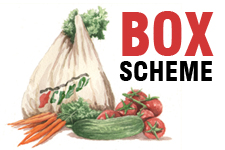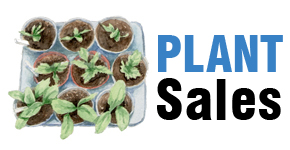Q: Why are the vegetables so muddy?
A: First off – that’s not mud, it’s soil! Organic vegetables grown in healthy soil within a natural system have been shown to contain higher levels of minerals and anti-oxidant micronutrients. Also, the soil acts as a natural preservative, so washing veg to remove the soil would cause it to go off quicker. We recommend scrubbing your veggies with a brush just before you’re going to use them.
Q: Why do the salad and other greens come in plastic bags?
A: Unfortunately, there’s currently no acceptable substitute for plastic in terms of keeping fragile greens fresh: paper and compostable plastics actually absorb moisture from leaves and make them go limp more quickly. Since 2009 we have run a number of trials on plant starch bags as alternatives to plastic for our salads. With each trial, the resulting food waste was unacceptable. We continue to research and keep an eye on the packaging market for better alternatives. When leaves (like certain kales) that are hardy enough to survive not being bagged, we bunch them with rubber bands.
It is worth noting that “single use” plastic bags can often be effectively cleaned and reused; and that the London Borough of Waltham Forest now takes clean plastic bags for recycling, although we acknowledge this is the “last resort” in the hierarchy of waste reduction.
Q: Why do we get carrots so often?
A: Potatoes, carrots and onions are the ‘staples’ of our veg bags. They are perfectly suited to our climate, store well and so are available almost all year round. Carrots are affordable and so allow us to spend more money on the other items in the bags. Plus, they’re really versatile and can be eaten raw, drank in juices, used as a base for stocks and soups or grated and baked into desserts – the possibilities are endless!
Q: Why is there so much root veg in winter?
A: Any trip to the supermarket will tell you how used we are to eating whatever we want, any time of year. But getting out-of-season produce to the UK means flying it in from overseas, or employing agriculturally-intensive farming methods such as using pesticides and fertilisers to force them to grow year-round or growing them in energy-intensive heated greenhouses. Food that travels far is also often chemically treated and wrapped in a lot of plastic packaging to avoid it being damaged in transit. Eating locally produced seasonal food is not only more tasty and healthy (the nutrients and flavours are better developed) but better for our environment.
Root vegetables like carrots, parsnips, beetroot, swede, Jerusalem artichokes and celeriac have traditionally provided the backbone of a seasonal winter diet here in the UK and so, as long as it’s available, we will always prioritise local growers and shorter journeys before turning to veg from further away. Get your winter warmer recipes out!
Q: I got a lettuce that had brown leaves on the outside…
A: You’ll sometimes find loose lettuces in your bags. We have the option of asking for them loose or in a plastic bag from the grower, so choose loose to cut down on packaging. We find the outer leaves act as natural protection – so they may get knocked around and go a little brown, but can be removed and the rest of the lettuce perfect to eat.
Q: Some of the ‘plastic’ bags are marked as ‘compostable’ but I’m never sure with the ones that aren’t…
A: The bags marked as ‘home compostable’ should ideally be added to a home compost pile or your food waste bin – failing that, your general waste bin. All other plastics should be cleaned and either reused at home, returned to us for reuse, or added to your general recycling.
Q: Why does produce sometimes look old/past its best?
A: We will always work hard with our growers to get produce to you in the best condition possible, but organic fruit and vegetables haven’t been chemically treated and so some don’t last as long once they’re on their way to you. It’s also common farming practice for some autumn and winter crops (like root veg and squashes) to be harvested then stored for months to see us through the winter months. This is normal, but you might notice a difference in appearance between, say, beetroot in March that’s been in storage for months, and fresh new-season beetroot in July. Both are equally nutritious and any differences in appearance are purely aesthetic – it’s still good, organic food.
Q: Can I return my packaging to you?
A: Yes, please do! Just leave it in your pick-up point next time you collect your bags, and we’ll reuse it.
Q: Why do my bags feel lighter in spring?
A: The hungry gap is a tricky time for farmers and for UK-only box schemes like ourselves. It’s a period in the spring (usually early April to early June) where the previous year’s stocks of vegetables start to run out before the new season produce is ready to harvest. You may notice your bags feel lighter at this time of year, as produce becomes harder to source and is more expensive, and you may see us supplementing your bags with items like locally grown dried pulses to provide some variety. This is the reality of seasonal eating in the UK, and we continue to support the farmers we work with through this period by buying what’s available, even though there may be less variety in your bags.
Q: Why aren’t there more berries in the fruit bags?
A: The UK fruit season is relatively short. For example, the apple season is generally mid-August to March; the pear season is a bit shorter. In the summer we can usually source organic UK plums, but the sad truth is that a lot of other organic UK fruit isn’t produced in large enough quantities that it’s affordable to us, or is too delicate for the bags (such as strawberries and raspberries).
Q: Why am I sent fruit that’s unripe?
A: Sometimes bananas, pears and kiwis will arrive unripe, (meaning they travel much better!) but will ripen at home providing you keep them in a warm, dark place (in a plastic or paper bag will speed things up). See more tips on storage here: www.organiclea.org.uk/we-sell-food/box-scheme/storing-fruit-and-veg/




